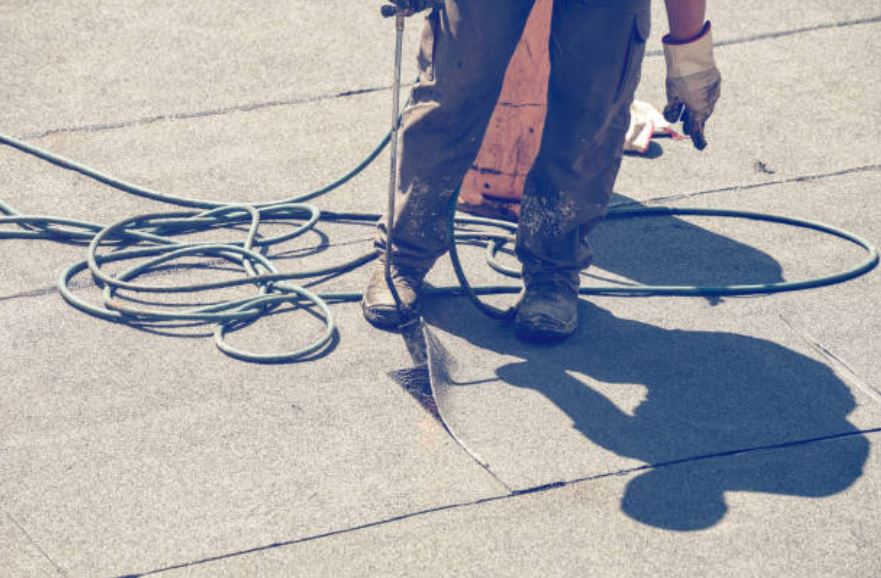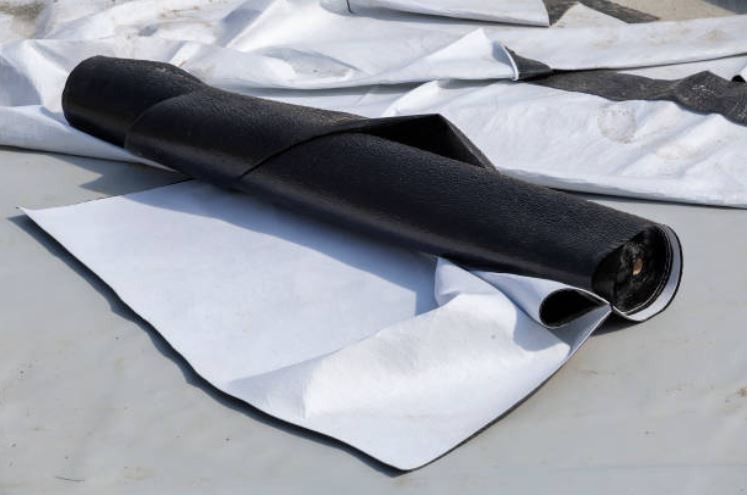If you are here to find the best roofing material for flat roof, then you came to the right place. In this blog post, we will share everything you need to know about the different flat roofing systems.
Many business owners come to us with one question – “What is the best roofing material for flat roof?” They already have an idea that flat roofing is ideal for commercial buildings but they do not know yet how to move forward from there. We want to make our clients understand that no roofing material is perfect but you can find the perfect fit for you. It may sound confusing but the point is that each material has its own pros and cons. The challenge is to strategically gauge which is more beneficial to you and for what purpose do you intend to use it. Flaws and drawbacks are all part of choosing the best roofing material for flat roof. Hence, be open to a lot of options and discuss with a reliable roofer to get expert opinions.
Keep on reading as we aim to answer all the questions you might have in relation to flat roofs.
What Makes Flat Roof an Ideal Choice?
When we are talking about flat roofs, it is easy to imagine a wide surface without obvious slopes and pitches. While this is true visually speaking, flat roofs do have slight pitches. They are even called low slope roofing because as a matter of fact, they do have very shallow slopes used for shedding water.

As affirmed by many commercial property owners (as well as residential homeowners), a flat roof is indeed a great choice. We have summarized the advantages of a low slope roofing system to give you a clearer overview of what to expect.
Cost-effective – Materials and labor generally cost less than other pitched roofs. This is the number one consideration that property owners consider when installing a flat roof.
Ease of installation – Since materials are more lightweight, they are less complicated, easier, and faster to install which affect labor cost as well.
Low maintenance – Flat roofs are also known to have fewer complications when it comes to repair and maintenance. When it comes to roof inspections, it is much easier to assess a flat roof than pitched or sloped roofs, thus reducing risks for workers.
Extra outdoor space – The flat surface offers extra space that an owner can transform into different things. These spaces can help generate income when you convert it into penthouses, gardens, parking spaces, and many more.
The Drawbacks of a Flat Roof
We have said it before, and we will say it again. There is no perfect roofing system. Each has its own disadvantages that a property owner should manage. Before you even decide, read through the list of flat roof drawbacks that you need to reconsider at the onset.

No curb appeal – There are certain limitations in terms of design. However, you can make up for it if you are going for a more modern look. The space that it gives also makes up for the absence of curb appeal.
Prone to leaks – Even if flat roofs have low slopes to drain water, there is still a tendency to pool water which may cause unwanted leakage.
Insulation issues – Since there is lesser space to reinforce insulation or ventilation, heat can easily penetrate the building’s interior.
Different Types of Flat Roofing Materials
The key to discovering the best roofing material for flat roof is to know your priorities. They will guide you in determining which roofing system would match your expectations, financial capabilities, as well as long-term and short-term plans.
Built Up Roof (BUR)
If you are after longevity, BUR or tar and gravel is a good choice. It can last up to 40 years with proper installation and regular maintenance. BUR is composed of several layers of tar and other waterproofing additives coated with either gravel or stone. Note that tar may shrink over time.

BUR is one of the most complicated flat roof materials to install due to its weight and composition. It involves melting of base materials and careful application over the surface. However, when it dries up it is also one of the sturdiest. BUR is priced at around $4 per square foot.
Mastic Asphalt
Mastic Asphalt is one of the oldest existing flat roofing systems. In fact, it has been around for more than a century already. It is known to be highly waterproof and durable.
Made from limestones and other additives, it is mixed with bitumen to form a moldable material. Installation requires reinforced joints making it more difficult. However, you can have it installed with only about $2 per square foot. Note that even if this is a low-cost material, labor may affect expenses. It lasts around 15 to 20 years.
Modified Bitumen
It is called modified bitumen because it is reinforced with polymer or fiberglass to increase durability. As a single-ply roofing system, modified bitumen is applied by rolling out the material after it has been blow-torched. This process allows the base to adhere to the surface securing it in place. Installation is crucial as it may dictate the performance and lifespan of this roofing system. Often, issues stem from substandard and poor workmanship.

Modified bitumen is highly weather resistant, flexible, and easy to repair. However, its lifespan is only between 10 to 20 years which is shorter than the average. Prices range from $4 to $6 per square foot.
Ethylene Propylene Diene Monomer (EPDM)
People looking for eco-friendly options should consider EPDM or rubber. The base synthetic material is composed of recycled rubber. Strips of rubber material are then seamed together using adhesive to make sure that it is completely sealed. Excellent workmanship is the secret to a long-lasting rubber roofing as it may decrease chances of leakage.
Rubber is proven to be waterproof, weather-resistant, and flexible. It is expected to last up to 50 years with proper installation and maintenance. It is one of the least expensive options costing around $0.80 to $2 per square foot.
Polyvinyl Chloride (PVC)
PVC is a strong and durable thermoplastic membrane. This vinyl material is reinforced with fiberglass or polyester. As a result, it becomes more long-lasting, fire and UV resistant. You can choose to apply PVC in three ways, hot-welded, fastened, or using adhesive.
The major downside of this roofing material is that it contains chemicals that are not environment-friendly.
It costs about $5 to $6 per square foot which is considered to be mid-range in terms of pricing.
Thermoplastic Polyolefin (TPO)
Even if TPO is a synthetic membrane, it is still viewed as a more eco-friendly option due to the absence of chlorine into its composition.

When installed correctly, it can effectively retard flame, reflect UV rays, and most importantly prevent moisture penetration. It is one of the newest materials introduced to the market, hence only few roofing companies are experts into handling this flat roofing system.
In terms of cost, it comes at the same price point as PVC with $5 to $6 per square foot.
Metal
The metal flat roofing system is in the higher price range. This is an important consideration because it can go as high as $800 per square foot depending on which type of metal you choose. It comes in different forms such as aluminum, steel, copper, and zinc.
This type of material is highly expensive because it is stylish, lightweight, free from chemicals, and durable. You cannot question its longevity for it can last up to more than 50 years if installed properly coupled with right maintenance. High-quality metals can also resist punctures.
Aside from the price, one of its disadvantages is the noise it makes during heavy rain or storms. However, metal is extremely weather-resistant and does not crack or burn.
Final Words
As you explore all your options to find the best roofing material for flat roof, look into what works best and where. Because in reality, all roofing materials have their fair share of strengths and weaknesses that you have to deal with. It is just a matter of what will work best to your advantage and something that you can manage for a long period of time. We want to reiterate that regardless of which flat roofing system you pick, workmanship is the ultimate make or break factor that determines success.
Consult with a reputable roofing contractor should you need more guidance and information on flat roofing systems.
J&M Roofing LLC provides professional roof repair, restoration and coatings for commercial businesses located in Northeastern Ohio, Northern West Virginia, and Western Pennsylvania. We specialize in low slope roofing systems presenting sustainable solutions to never-ending leaking, ponding, and rapid deterioration issues.
Call us today and let us give you the best commercial roofing services you need:330-575-4784

